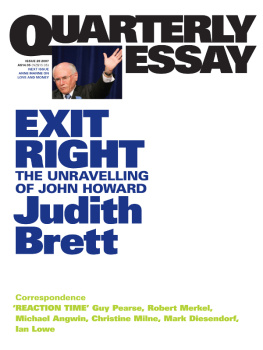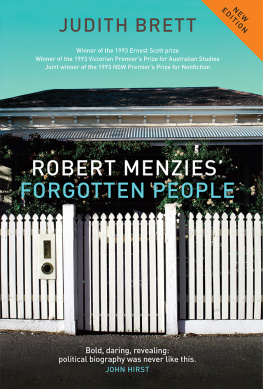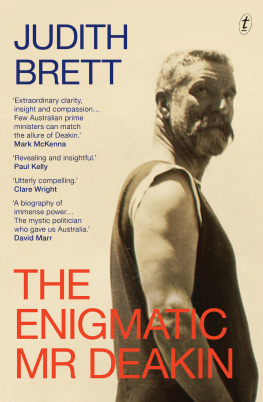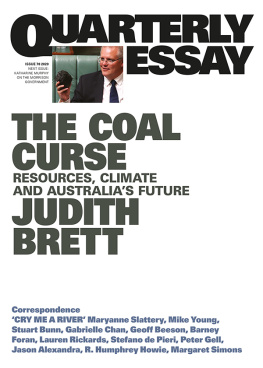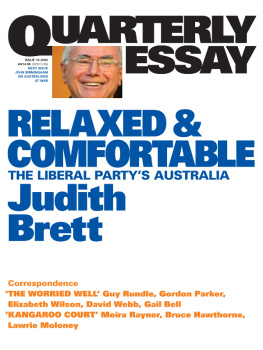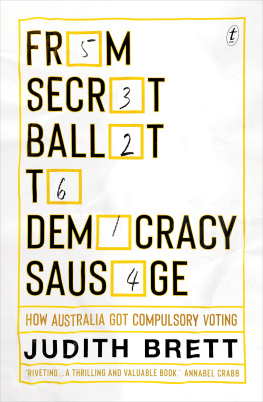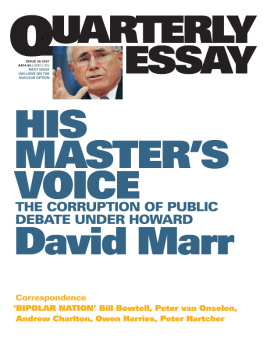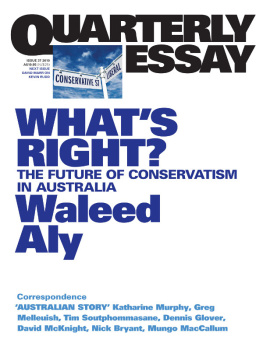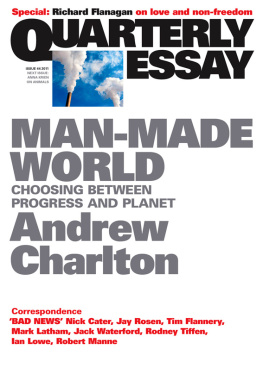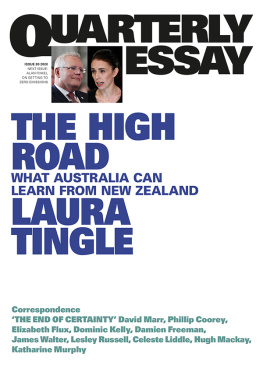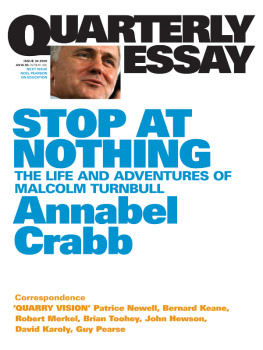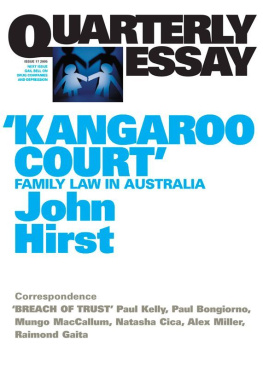Quarterly Essay is published four times a year by Black Inc., an imprint of Schwartz Publishing Pty Ltd. Publisher: Morry Schwartz.
ISBN 9781863951111 ISSN 1832-0953
ALL RIGHTS RESERVED.
No part of this publication may be reproduced, stored in a retrieval system, or transmitted in any form by any means electronic, mechanical, photocopying, recording or otherwise without the prior consent of the publishers.
Essay & correspondence retained by the authors.
Subscriptions 1 year (4 issues): $49 within Australia incl. GST. Outside Australia $79.
2 years (8 issues): $95 within Australia incl. GST. Outside Australia $155.
Payment may be made by Mastercard, Visa or Bankcard, or by cheque made out to Schwartz Publishing. Payment includes postage and handling.
To subscribe, fill out and post the subscription card, or subscribe online at:
www.quarterlyessay.com
Correspondence and subscriptions should be addressed to the Editor at:
Black Inc.
Level 5, 289 Flinders Lane
Melbourne VIC 3000 Australia
Phone: 61 3 9654 2000
Fax: 61 3 9654 2290
Email:
quarterlyessay@blackincbooks.com (editorial)
subscribe@blackincbooks.com (subscriptions)
Editor: Chris Feik
Management: Sophy Williams
Production Co-ordinator: Caitlin Yates
Publicity: Anna Lensky
Design: Guy Mirabella
Printer: Griffin Press
EXIT
RIGHT
The Unravelling
of John Howard
Judith Brett
The unravelling of John Howard began on the day in early December 2006 when Kevin Rudd was elected leader of the Opposition. Over the ensuing eleven months, Howard relied on all the strengths of his conviction-based leadership, all the arguments he had put to the electorate for the past eleven years, and all the political gambits available to an incumbent fighting for his political life. But they had stopped working. It is when a leaders grip on political power starts to slip, when his threats and bribes miss their mark, when he starts to make uncharacteristic mistakes and when what had once been strengths reveal their limitations, that we can see most clearly the inner workings of that leadership. This essay is about John Howards leadership, seen through the prism of its failings.
In 2004, when he turned sixty-five, Howard promised to remain prime minister for as long as the Liberal Party and the voters wanted him to. And he repeated the promise in July 2006 when Peter Costello, considering a challenge, argued for a smooth transition. The question of who leads the Liberal Party is a matter for the Liberal party-room, Howard told the ABCs PM. Again and again when the question of his retirement plans was raised, Howard reiterated, over and over, that he would continue as leader for as long as my party wants me to, and it is in the best interests of the party that I do so. Thats always been the case and it cant be otherwise.
There was always a deep disingenuousness in Howards position. At face value, and this is how he wanted it to be taken, it disavowed personal ambition and put him at the service of the party and the nation. But it was also defiant, saying that if you want me to leave, you will have to throw me out. Howard, of course, pointed to the benefits of experience and a wise head. But whatever he said or promised, he could not escape the fact that he was getting old. And with Rudd rather than Beazley as his opposite number, he looked it.
At a deeper level, the problem with Howards position on the leadership succession was not just its defiance in the face of challengers, but its apparent denial of the reality of his age. Howard had turned sixty-eight on 26 July 2007. When the next election came round in 2010, he would be seventy-one. What could he say to the electorate about his intentions? Elect me and I promise to stay on till Im seventy-one, and then I may even run again, like my hero Robert Menzies, who stayed on till he was seventy-two! Or elect me and at some unspecified date before the next election I will retire and pass the leadership on to my loyal and patient deputy, who already looks worn out from all those hard years in Treasury. Or elect me and someone else entirely might become prime minister after I retire, for after all, the leadership is not really mine to pass on; as Ive said over and over, it is the party that decides. At least if one voted for Kevin Rudd, one knew that he intended to lead the country for the full term. In this scenario, a vote for Rudd would be the vote for certainty.
The more I thought about it, the more convinced I became that Howards age was his Achilles heel. I could not see how it would not be a problem for his campaign, the elephant in the room of every press interview and policy announcement, the question that would not go away because Howards answers to it were so inherently implausible. I could not see how it would not tip the undecided votes Rudds way.
And so in March I rang Chris Feik and suggested that I write the December Quarterly Essay, based on the premise that Howard would lose the election. I would write the story of Howards election year as the one in which he headed for the defeat which all my political intuitions told me was inevitable.
Another reason for my conviction that Howard would lose the election was my interpretation of his 2004 victory. When Mark Latham first became Labor leader in December 2003, he enjoyed a groundswell of popular support. A breath of fresh air after Beazley and Crean, he had energy and new ideas and seemed to offer new political possibilities. In those first months he enjoyed approval ratings in the 60s and Labor led the Coalition on the two-party preferred vote by an election-winning ten points. As we got closer to the election, this support fell away and Lathams personal flaws started to become more apparent: his pleasure in the politics of envy and the barely concealed aggression he displayed in a bone-crushing handshake with Howard in full view of the cameras. But come election day, 47.2 per cent of the preferred vote still went to Labor.
Thinking about the likely outcome of the 2007 election, I drew two conclusions from Lathams period as leader. First, that the early support for Latham had little to do with Latham himself and was in fact evidence of many peoples desire for an alternative to Howard. And secondly, that there was no reason for the 47.2 per cent of the vote that went to the ALP in 2004, even with the unelectable Latham as leader, to shift. This was a baseline of Labors electoral support, which is often forgotten in the winner-takes-all government conferred by election victory. After every election and for a good time in between, the media commentary is full of claims about the Australian people, the Australian electorate, the voters, and the way they have rejected the loser and embraced the winner. Such collective nouns obscure the fact that almost half of the electorate voted for the other side, and that they are still there, accepting the legitimacy of the election outcome but withholding their approval for much that the government does. After all, they didnt vote for it and as likely as not they wont next time.
Already lined up against Howard as we headed into the 2007 election was almost half the electorate who never believed in Howard the leader of the Australian people but always saw him primarily as a partisan figure of conflict and division. There were the left-liberals who were appalled by the way he gave permission to Pauline Hanson to air her racist views, evaded responsibility for the children overboard affair and for the scandalous behaviour of the Australian Wheat Board, by the harshness and hypocrisy of his asylum-seeker policies, by his stacking of public bodies with right-wing warriors, by his governments unrelenting hostility to the ABC, by his bullying of public servants, and so on. Many trade unionists and working-class voters never trusted him not to govern as Liberal governments always do, in the interests of small and big business. And many Australians of ethnic background distrusted his backward-looking, British-centric version of Australian nationalism. These people were all still there. And so too, as the rising vote for Labor in blue-ribbon, middle-class Liberal seats shows, were defecting Liberal liberals with moral qualms.

